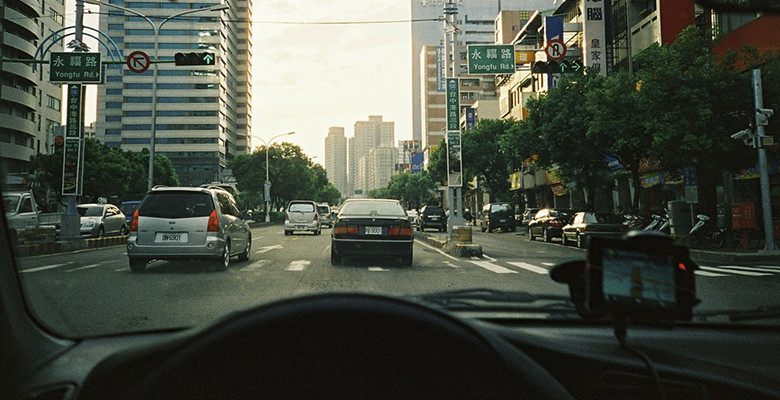
In many areas outside the big cities, having a motor vehicle is important for getting from A to B. This section will help you understand what is involved in driving in Taiwan.
Getting a License
International Driving Permits (IDP) issued in most countries are valid in Taiwan for 30 days. Once this 30 day period has expired, you can still use the IDP providing you first visit a Highway Supervision Office and complete an International Driving License Permit Application. This will allow you to drive legally until the IDP expires (usually 12 months). IDPs can be obtained from motoring organisations like the AAA in the US, or AA/RAC in the UK.
To obtain a local license, foreign nationals from most jurisdictions must complete a driving test at a Motor Vehicle Supervision Office. There are different categories of permit available; the primary ones are passenger car, small motorcycle (<50cc), ordinary heavy motorcycles (50–549cc) and large heavy motorcycles (550cc and up). Each category has different requirements, but all involve a computerised theory test (available in English) and a driving test on a closed circuit. There is no street driving portion to the test; perhaps something that influences the low driving standards in Taiwan.
[See also: Getting a Driving Licence in Taiwan: Taking Lessons]
Buying and Owning a Vehicle
In order to purchase a vehicle in Taiwan you will need to have a valid ARC. For second-hand vehicles you will need to go to the DMV with the seller to complete the registration. With a new vehicle the vendor will help you complete the formalities. With low standards of driving and maintenance common in Taiwan, those buying a used vehicle are advised to look at a potential purchase extremely carefully before making a decision. Government checks on older cars are cursory in the extreme, simply checking whether the lights and brakes work, that the vehicle meets emissions standards, and that the wheels are properly aligned.
One important thing to look for when buying a used vehicle is flood damage. Taiwan experiences regular typhoons and torrential rains, leading to flooding in low-lying areas. Checking in the door cavity, wheel arches and engine cavity for tide marks is essential. For a reasonable fee an organisation like the British-run Autocheckers will conduct an extensive series of tests on any used vehicle (to UK standards), providing peace of mind before you purchase. They also source cars for those who know what they want to buy.
Insurance
All motor vehicles in Taiwan must be insured. Options include third-party only and comprehensive, and in contrast to many other countries it is the vehicle that is insured, not the driver, meaning that any qualified driver can legally drive the vehicle with the owner’s permission. In the case of a traffic collision, it is relatively common for both parties to agree to continue on their separate ways if the damage is light. If it is more serious, sometimes the guilty party will offer a cash settlement immediately to keep the police and insurance company out of the situation. If you are involved in a collision good advice is to call the police and wait for them before discussing any settlement with the other party.
Leasing a vehicle
Rental companies are often found around major transit hubs like airports and rail stations. You will need your passport or ARC and a valid driver’s license (International Driving Permit or local license). Other rental outlets can be found with an internet search. Usually any vehicle you rent will have a small amount of fuel in the tank, and the rental company will tell you where the nearest gas station is in order for you to fill up immediately.
Road Safety
Thanks to poor driver education, and the lack of both a serious driving test and serious enforcement of traffic rules, driving standards in Taiwan are low, and often dangerous. Many drivers will display only a bare minimum of common sense in operating their vehicle, and accident rates are consequently very high. If you choose to drive in Taiwan, you should do so in a defensive fashion and be prepared for anything. It is not at all uncommon for vehicles to emerge from blind exits without checking oncoming traffic, to ignore stop signs, to straddle lane dividers, to run red lights, to tailgate, and to turn without indication or checking their mirrors. On smaller streets you will also see people pull out right in front of you, or stop dead in the middle of the road if something catches their attention. Using cellphones or eating while driving is also common.
Defensive driving means driving in a way that maximises the safety of you and the people around you. This includes leaving sufficient distance to stop in an emergency (often known as the “two second rule”), focusing your full attention on driving, and anticipating potential hazards like someone stepping out into the road, or a patch of wet road increasing safe stopping distance.
The value of defensive driving is further increased if you are on a two-wheeled vehicle, as the risk of seriously injuring or killing yourself on a scooter is greater. Always wear a full-face helmet, properly secured, and check online forums for recommendations of safe helmets. Avoid the NT$100 plastic helmets known as “fine avoiders” because while the police sometimes fine riders without a helmet, they do not care about the quality of the helmet you are wearing. Almost everyone in the foreign community will know someone who was killed or seriously injured while riding a scooter; think carefully about whether you need to do it at all, and if you do, stay safe.
In recent years the major cities (led by Taipei) have begun to clamp down on drink-driving. There are campaigns to increase public awareness as well as catch offenders. Roadblocks are frequently set up in the late evening to look for drivers who have been drinking. This writer personally has known three foreigners who have died and a further two who have been permanently brain-damaged in scooter crashes. In all but one case alcohol was a significant factor. With taxi fares in Taiwan at a very reasonable level, take the sensible and safe choice, and leave your vehicle behind when you go out for the evening.
Image by Hungju Lu, and licensed under the Creative Commons.

